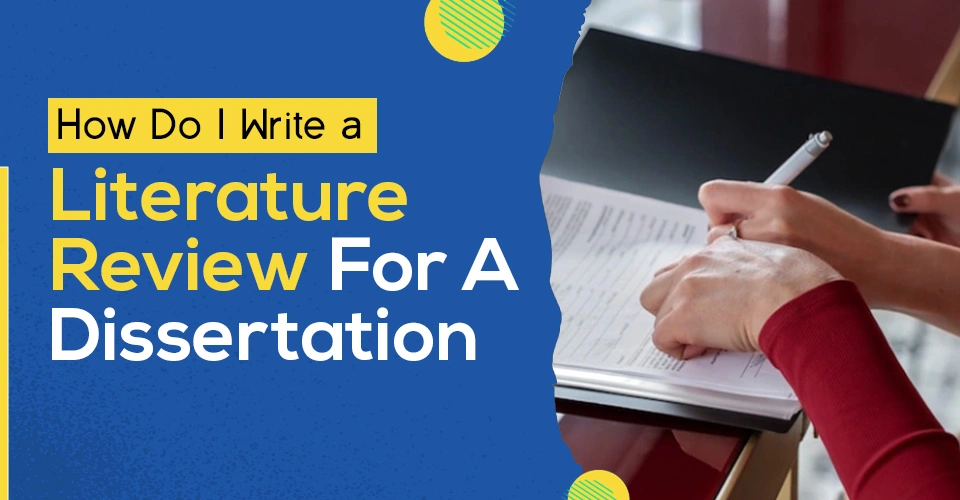
How Do I Write A Literature Review For A Dissertation
Summary: The writing of a dissertation literature review is not simply about repeating prior studies but involves synthesizing, evaluating, and summarizing former research. Such practice should be avoided since you are creating a perfect groundwork for your dissertation by presenting a clear outline of the material to be reviewed and analyzing the sources critically. It can also be helpful to seek feedback from experts to avoid typical mistakes and enhance your literature review.
The literature review takes an integral position in the framework of a dissertation and therefore the bulk of the work is dependent on it. It surveys the written work on the topic chosen and enables the author to integrate his work within the existing academic framework.
What is quite terrifying, however, for many students, is the task of writing the literature review but it does not have to be so. For those who follow the proper procedure, the prospect of being able to present a literature review that will boost your dissertation can become a reality.
This guide will focus on several issues, one being the difference between the tasks of writing a literature review and, examining the data. If this is your first time attempting to write, or you are in the process of revising the draft of your work and you hope to do a better job, then the following pointers should assist you a lot.
What is a Literature Review for a Dissertation?
First, before you start writing a literature review for a dissertation, making sense of what this kind of work requires is essential.
By using a literature review, every academic piece available in the specific field of study is reviewed. Some of its main aims are:
- To analyze and integrate any relevant or useful sources that have been used previously by other scholars.
- Filling in literature searches, visualization gaps and some inconsistencies.
- To annotate your research by using previous ones to show how useful or necessary the particular research is.
From a preliminary work perspective, literature review appears to be easy but in essence, evaluation and analysis of sources that you wish to include is more complicated than that.
Why a Strong Literature Review Matters
In the eyes of fluent readers, a literature review is a vast task as it accomplishes several goals:
- It demonstrates that the researcher is well-versed in the field.
- It gives an account of the significance of the research.
- It gives a perspective on the method to be used and the results expected.
Getting more focused on the context of the literature review gives you an advantage and will be helpful for you during the rest of your dissertation.
How to Write a Literature Review for a Dissertation
Although writing a literature review can feel overwhelming, it can be made much easier by breaking it down into smaller, more manageable sections. This is how you go about it:
Step 1: Understand the Purpose
Make sure you understand the purpose of your literature study before you start.
- What do you aim to accomplish with this review?
- In what way does it help my dissertation?
More than just summarising, a good literature review establishes the context for your research by demonstrating how it fits within the larger academic discussion.
Step 2: Define Your Scope
Choose the topics you want to cover in your review. You don't have to include every article that has ever been written about that topic. Rather, focus on sources that are closely related to your study subject. Think about these:
- Time Frame: Are you considering research from a longer period or only within the last five years?
- Key themes: What concepts, theories, or arguments are most important to the topic you are researching?
- Methodology: Are you concentrating on particular research techniques, like qualitative or quantitative studies?
Step 3: Search for Relevant Sources
High-quality, trustworthy sources are essential for writing a compelling literature review. Make use of scholarly databases such as
- PubMed
- JSTOR
- Google Scholar
- Your university library catalogue
As you read, remember to take detailed notes. To facilitate the writing process, arrange your sources according to themes, approaches, or periods.
Step 4: Analyze and Evaluate
A competent literature review does more than just summarise research. Examine each source attentively as you read it:
- What are the research's advantages and disadvantages?
- Do the methodologies fit the research questions?
- What relevance do the findings have to the topic of your dissertation?
For instance, if multiple studies emphasise one facet of the topic while overlooking another, you can identify this gap and describe how your dissertation will address it.
Step 5: Organize Your Review
Structure is key to a clear and coherent literature review. A typical structure includes:
Introduction:- Briefly state the purpose of the review.
- Outline the themes or areas you’ll cover.
- Divide the body into sections based on themes, periods, or methodologies.
- Compare and contrast studies within each section.
- Summarize the key findings from your review.
- Highlight how your dissertation addresses gaps in the literature.
How to Write a Good Literature Review for a Dissertation: More Tips
Do you want to make your literature review unique? The following advice can help you write a strong one: You may make sure that your review not only summarises the body of research but also presents it in a way that makes a significant contribution to your field by emphasising clarity, critical analysis, and logical organisation.
Be Selective
Focus on the high-quality and most relevant sources. Your review's impact may be lowered if you include too many irrelevant studies. Make sure your review stays relevant and aimed while providing useful data about your field of study by giving attention to studies that directly address your research topic.
Stay Critical
A good literature review doesn’t just describe what other researchers have said—it evaluates their work. Highlight strengths, weaknesses, and gaps in the literature.
Use Clear Organization
Group related studies together under clear headings and use transitions to connect ideas. A well-organized review is easier to read and more persuasive.
Write Clearly
Use simple, concise language. Avoid jargon or overly complex sentences. Remember, your literature review should be accessible to readers both inside and outside your field.
Seek Feedback
Ask your advisor or peers to review your draft. Their feedback can help you refine your arguments and improve the clarity of your writing.
How Long Should a Literature Review Be for a Dissertation?
The total length of your dissertation and the program's requirements will determine how long your literature review should be.
- The literature review may be between 2,000 and 3,000 words, as an average for dissertations that are between 10,000 and 15,000 words.
- For dissertations that are lengthier (say 50,000 words), the review may be 5,000 words or longer.
Always verify the requirements of your university. Quality is more important than quantity, even though meeting length expectations is important.
Challenges Students Face When Writing a Literature Review
It can be difficult to write a literature review, particularly if you've never conducted academic research before. It calls for managing huge amounts of information, maintaining integrity when evaluating sources, and striking a balance between thoroughness and concentration. Some common obstacles include:
- Finding relevant sources.
- Organizing your ideas.
- Analyzing studies critically.
- Managing your time effectively.
If you're having trouble, think about getting help. Some students choose to pay for dissertation help, which may involve assistance with organising or creating a literature review. Expert services can help you save time and create a review that passes academic requirements.
Common Mistakes That You Must Avoid
It is essential to conduct your literature review with focus and attention to detail because common mistakes might cause your efforts to be lost.
Including Irrelevant Studies
Pay attention to sources that have an immediate impact on your research. Refrain from including every article you come across.
Lack of Critical Analysis
Just summarising research is not enough. Prove that you can evaluate their contributions to your field and that you understand the implications.
Poor Organization
Your readers may become confused by an unstructured review. To produce a clear narrative, use headings, subheadings, and logical transitions.
Ignoring Feedback
Your advisor's advice is very useful. Don't pass up the chance to improve your review using their advice.
Refining Your Literature Review
You can make changes to your literature review at any time. You might need to go back and revise your research as it develops.
Tips for Refinement:
- Enhance your findings with recent research.
- Remove any sources that are out of date or unrelated.
- Improve the weak points in your analysis.
Making constant improvements will guarantee that your literature review continues to serve as an excellent foundation for your dissertation.
Conclusion
Writing a literature review in a dissertation can be difficult, but it is a beneficial exercise to fortify your project. So by knowing why you are writing it, establishing your parameters, and evaluating the literature appropriately, you can write a review that complements and strengthens your dissertation dissertation.
Keep in mind that a good literature review should not only be a requirement but also a way to contribute meaningfully to your field and highlight your expertise. A literature review is not a nice to have, it is often something that can be at the very heart of your dissertation, and with proper planning and persistence, you too can write an excellent review that stands out.
